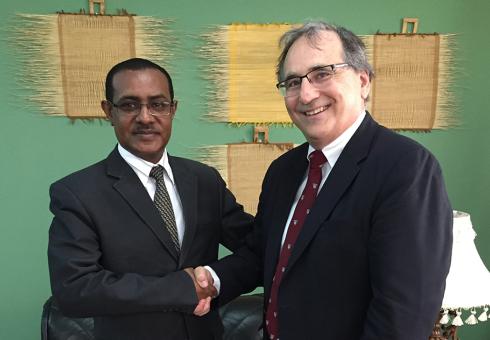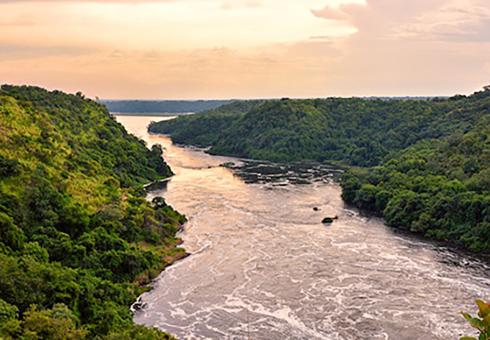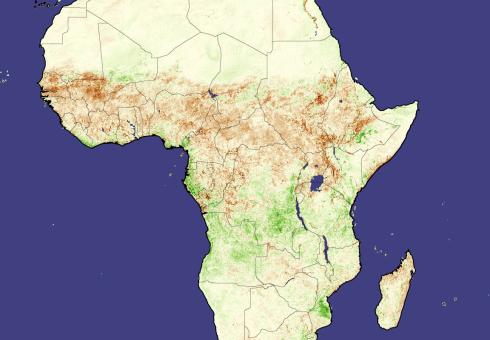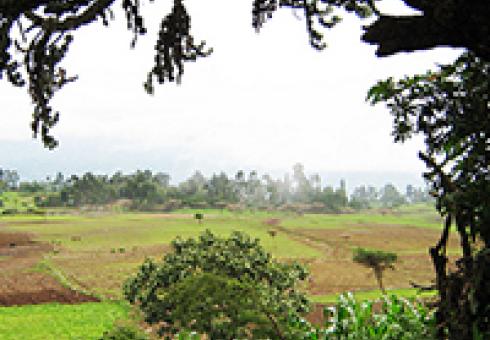Kenneth Strzepek applies models to help decision-makers advance food security and sustainable development in a climate-compromised continent
News and Outreach: Kenneth Strzepek
ClimateWire: MIT Joint Program Research Scientist Kenneth Strzepek comments on the need for flexibility in water-sharing agreements in the Nile basin
Over the next century, southern Africa will see widespread decreases in maize production
How Models Can Help Agriculture Adapt to Climate Change Uncertainties
Study finds high risk of severe water stress in Asia by 2050
The largest hydroelectric project in Africa has so far produced only discord
The Economist
WHEN Egyptian politicians discussed sabotaging the Grand Ethiopian Renaissance Dam in 2013, they naturally assumed it was a private meeting. But amid all the scheming, and with a big chuckle, Muhammad Morsi, then president, informed his colleagues that their discussion was being broadcast live on a state-owned television channel.
Embarrassment apart, it was already no secret that Egypt wanted to stop the largest hydroelectric project in Africa. When Ethiopia completes construction of the dam in 2017, it will stand 170 metres tall (550 feet) and 1.8km (1.1 miles) wide. Its reservoir will be able to hold more than the volume of the entire Blue Nile, the tributary on which it sits (see map). And it will produce 6,000 megawatts of electricity, more than double Ethiopia’s current measly output, which leaves three out of four people in the dark...
EXCERPTS:
. . . A sense of mistrust hangs over the dam’s ultimate use. Ethiopia insists that it will produce only power and that the water pushing its turbines (less some evaporation during storage) will ultimately come out the other side. But Egypt fears it will also be used for irrigation, cutting downstream supply. Experts are sceptical. “It makes no technological or economic sense [for Ethiopia] to irrigate land with that water,” as it would involve pumping it back upstream, says Kenneth Strzepek of the Massachusetts Institute of Technology. . .
. . . How much water Sudan uses in the future, and other variables such as changes in rainfall and water quality, should determine how the dam is operated. That will require more co-operation and a willingness to compromise. Disagreement between Egypt and Sudan over such things as the definition of “significant harm” bodes ill. But all three countries will benefit if they work together, claims Mr Strzepek, citing the dam’s capacity to store water for use in drought years and its potential to produce cheap energy for export once transmission lines are built. . .
Read the article in The Economist.
Photo: Landsat-7 satellite image of the bend in the Nile River and adjacent farmland (Photo courtesy of Jesse Allen, NASA)
MIT researchers explain how technical analysis can avoid potential conflict.
CAMBRIDGE, Mass. — On the Blue Nile in Ethiopia, construction is underway on a public works project of gigantic physical proportions and exquisite political delicacy. The Grand Ethiopian Renaissance Dam, now about halfway finished, amounts to a test: With water becoming precious enough to be the stuff of war, can nations find ways to share it?
So far, so good. The project is moving toward completion, and a recent joint declaration of principles by the leaders of Egypt, Ethiopia and Sudan pledges cooperation and no “significant” downstream harm. That is critical, given that the dam will control nearly two-thirds of the water on which Egypt depends. But for the cooperation to be meaningful, these three countries will need serious technical analysis. Poor assessment of such matters as the variability of annual rainfall or minimum flows required to maintain downstream water quality could undermine a decent agreement, leading to conflict of unpredictable intensity.
That’s because the flow of the Nile is climatic roulette. It experiences periods of plentiful water and periods of extended drought, and it always has: Remember the story (in both the Bible and the Quran) of seven years of plenty, and then seven lean years? But now the stakes are much higher: Egypt’s population is 90 million, and growing. That country’s Aswan High Dam, downstream from the Ethiopian dam, helps to moderate these fluctuations, but a second large dam and its reservoir higher upriver are going to complicate things.
Egypt now receives virtually all its water from the Nile — about 60 billion cubic meters a year, slightly above the amount provided for in its treaty agreement with Sudan. That amounts to the withdrawal of 700 cubic meters per capita per year. Compare that with California, which annually withdraws about 1,400 cubic meters per capita from multiple sources, including 30 percent of the Colorado River’s annual flow, and you understand just how scarce and precious the Nile’s water is to Egypt’s welfare.
California depends heavily on Lake Powell and Lake Mead, the reservoirs behind dams on the Colorado River, which together store slightly more than three years’ worth of that river’s total flow. The new dam in Ethiopia will have an even larger storage capacity than that of Powell and Mead combined, but still amounts to just 1.5 years of the flow of the Blue Nile alone. Adding in the very large reservoir behind Egypt’s Aswan High Dam gives a storage of about 1.75 years of the total flow of the Nile. It’s not a wide margin of safety for a long drought — as Californians will attest.
The monsoon rains in Ethiopia that will feed the new dam come mainly during just three months, so by storing that water, the new dam will moderate and smooth out the flow of the Blue Nile, the 900-mile-long headstream of the Nile itself. It will also generate huge amounts of electricity, the sale of which could finance much-needed development in Ethiopia — except that transmission lines to export the power are not yet being built.
Just as California has used stored water to become an agricultural powerhouse, Sudan will benefit by using the more stable flow of water from the new dam to raise its agricultural productivity. This will allow Sudan, which sits between Ethiopia and Egypt, to finally employ its full treaty allotment of river water, which in turn will reduce what is available to Egypt.
It’s clear that a cooperative agreement among Ethiopia, Sudan and Egypt is needed to avoid conflict and downstream harm. This includes agreement on what amounts to “significant” harm, given that, in the past, Egypt has been willing to go to war to protect its water.
All three countries stand to benefit if they work together. The dam’s huge storage capacity could help both Sudan and Egypt during drought years. And if Egypt were to agree to buy the power that the new dam will generate (and to build the transmission lines to connect to it, perhaps with international help), then Ethiopia will benefit economically from stored water that has to flow downstream eventually.
Here is where the technical issues will be critical. Last November, the Abdul Latif Jameel World Water and Food Security Lab at M.I.T. convened experts on Nile Basin water resources. They pointed out that management of a river system with multiple dams required sophisticated joint management with a shared knowledge base and scientific modeling framework. The hard negotiations ahead to achieve detailed agreements on such things as reservoir operation policy, power trading, dam safety and irrigation practices will require that foreign policy and water experts from each of the three countries have a shared understanding of the technical issues and a willingness to compromise.
In May 2015, the three countries engaged technical consultants to assist with these problems, but that arrangement has since collapsed over disagreements about project management. It behooves the international community to help, through support of regional efforts like the Nile Basin Initiative, to build scientific and engineering coordination and knowledge among the three countries, provide impartial expertise, set up a management system and perhaps offer a process to resolve disputes.
The world needs to get good at sharing water, and right away. The alternative is frequent regional conflicts of unknowable proportions.
John H. Lienhard V is a professor at M.I.T. and director of the Abdul Latif Jameel World Water and Food Security Lab. Kenneth M. Strzepek is a research scientist at the M.I.T. Joint Program on the Science and Policy of Global Change.
MIT Spectrum interviews MIT alumnus Kenneth Strzepek, who led a nonpartisan panel of 17 experts to investigate the international water debate between Egypt and Ethiopia in the hopes of forging a common solution.
For millennia, Egypt has relied on the Nile River for its agriculture. So Egyptians were understandably upset in 2011 when their upstream neighbor, Ethiopia, announced plans to build a hydroelectric dam that threatened to reduce the flow out of the spigot: the Grand Ethiopian Renaissance Dam (GERD), sited along a major tributary that contributes most of the water flowing into the Nile. Two years ago, then prime minister Mohammed Morsi even threatened to go to war.
In an effort to break the stalemate, Kenneth Strzepek ’75, SM ’77, PhD ’80 led a nonpartisan panel of 17 experts convened last November through MIT’s new Abdul Latif Jameel World Water and Food Security Lab (J-WAFS) to investigate the issue and forge a common solution. MIT Spectrum spoke this spring with the alumnus—who is currently a research scientist with the MIT Joint Program on the Science and Policy of Global Change and the MIT Center for Global Change Science—about the “great moral dilemma” at the heart of the conflict, and the value of objective advice.
What is your background on water issues in the Nile Basin?
I did my PhD at MIT on water issues in Egypt. For the last 10 years, I’ve been working with the World Bank on the Nile Basin Initiative to come up with a comprehensive framework agreement between all the sovereign states in the region on how to manage the Nile.
What is it that draws you to work on water issues?
Water is such a metaphor for life. At one point, I thought I might go into the ministry. When I went to Africa as an MIT sophomore, I saw the great impact of water on people’s lives, and I realized water resources development was a way I could integrate my faith with my profession by providing physical water as well as spiritual water to people.
What are the roots of the conflict between Egypt and Ethiopia?
Rather than one principle on allocating water across boundaries, the UN has two principles—that all people should have equal access to water within their boundaries, and also that there should be no harm to anybody who is currently developed downstream. Egypt has been using all of this water for thousands of years; if anyone upstream uses some of it, that violates the “do no harm” principle. On the other hand, if 75% of their water comes from Ethiopia, how is it equitable that [Ethiopia] can’t take a drop? So we have this great moral dilemma.
What were the major questions you discussed?
When this dam is completed and filled, it is going to lead to some additional evaporation, and less water going to Egypt, though some suggest that joint operation of the GERD and the Egyptian Aswan High Dam (AHD) could reduce total losses. Could the impact of water loss on Egypt’s economy be offset by Ethiopia selling some of the GERD’s low-cost, clean electricity to Egypt so there would be benefits to both countries? We also knew that since the capacity of the dam is greater than the annual flow of the river, the issue of filling the dam was critical—if Ethiopia started filling the dam and there was a drought, could they stand to wait for years before resuming?
What kind of debates did you have among the members on your panel?
Most of the conclusions were quite universal. When you are not party to a debate, it’s not as impassioned for you. None of us have that history of distrust that the governments have. When Egypt says “We’ve been using that water for 10,000 years,” Ethiopians will say, “Yeah, our water!” Most of us saw that if this was all one country, there would still be upstream-downstream debates, but you could work out a win-win solution.
What are some of the recommendations you made?
The first conclusion is the need to manage the dam cooperatively with the AHD in Egypt. No river with two reservoirs of such size without a plan to operate them in concert will benefit both parties. Not to manage them cooperatively would be a recipe for disaster. Secondly, the dam is going to produce a lot of electricity, but right now there is no sales agreement or connection to export it out of Ethiopia. There needs to be a power plan in place to bring electricity to users or Ethiopia will have no incentive to let water out of the dam through its turbines so it can reach Egypt.
How have the countries responded to the report?
Both Egypt and Ethiopia have commented on the report, and although they expressed some reservations, a week after we presented it, the countries signed a declaration of principles, which is basically an agreement to agree. We can’t know how much impact our report had on that decision, but it was in their hands when they signed the agreement. They are still far away from agreeing to the specific plan to operate the GERD, but the report and follow-up discussions in Cairo and Addis Ababa have outlined a process to facilitate the technical steps towards developing such a plan.
What do you think your report achieved?
A nonpartisan, world-class, international group convened by MIT and including a number of MIT experts has outlined the technical issues facing Ethiopia, Sudan, and Egypt, and has helped put a boundary to negotiations among the countries. We wanted to make this public so there would be some sound technical information out there as they continue their negotiations. We have offered an objective assessment of the current situation and built connections among key water decision makers involved in the basin. I am very proud of what MIT and J-WAFS did; I pray this activity has and will continue to reduce conflict in the region.
Read more about the Grand Ethopian Renaissance Dam report at MIT News.
Report from conference at MIT addresses potential effects of huge construction project.
By David L. Chandler | MIT News Office
According to present plans, the Grand Ethiopian Renaissance Dam (GERD) — now under construction across the Blue Nile River in Ethiopia — will be the largest hydroelectric dam in Africa, and one of the 12 largest in the world. But controversy has surrounded the project ever since it was announced in 2011 — especially concerning its possible effects on Sudan and Egypt, downstream nations that rely heavily on the waters of the Nile for agriculture, industry, and drinking water.
To help address the ongoing dispute, MIT’s Abdul Latif Jameel World Water and Food Security Laboratory (J-WAFS) convened a small, invitation-only workshop of international experts last November to discuss the technical issues involved in the construction and operation of the dam, in hopes of providing an independent, impartial evaluation to aid in decision-making. The group’s final report, which was shared with the three concerned governments in early February, is being released publicly today.
On March 23, the three governments signed an agreement to enter negotiations for final settlement of issues surrounding the dam’s operations. Though the agreement is preliminary, it marks a significant step forward.
Professor John H. Lienhard V, the director of J-WAFS, was among the organizers of the November workshop held at MIT. He says that the group was carefully selected to include top experts on water resources engineering and economics and on the Nile Basin, and was charged with reviewing the current state of technical knowledge on the GERD and its potential downstream impacts. The idea was “to give advice, and do it impartially,” Lienhard says.
“We went out of our way to find people who know about large dams and large rivers, and who are not affiliated with any of the three governments,” including people with “hands-on experience with dams of this scale,” Lienhard says. The meeting also included observers from Egypt, Sudan, and Ethiopia. After the report was shared, members of the group also met with officials in Egypt and Ethiopia to review the technical issues.
Technical issues
The working group developed consensus recommendations, which were incorporated into the 17-page report. It reflects agreement reached at the November workshop, says Lienhard, who is also the Abdul Latif Jameel Professor of Water and Food at MIT.
The report raises five technical issues that require resolution. First, the GERD will join the Aswan High Dam as a second large reservoir on the Nile River. Egypt and Ethiopia need to formulate a plan for coordinating the operation of these two dams, so as to equitably share Nile waters during periods of reservoir-filling and prolonged drought. Nowhere in the world are two such large dams on the same river operated without close coordination.
Second, the design of the GERD requires that a very large “saddle dam” be built to prevent water stored behind the GERD from spilling out of the northwestern end of the reservoir. The risks associated with a possible failure of this saddle dam may not have been fully appreciated, and must be carefully managed.
Third, there is concern about the location and capacity of the GERD’s low-level release outlets to provide water to Egypt and Sudan during the reservoir’s filling or periods of drought.
Fourth, the hydropower generated from the GERD exceeds Ethiopia’s current domestic power market, and it will therefore need to be sold outside Ethiopia. A plan is needed for such sales, and for the construction of transmission lines to regional markets. A power trade agreement will ensure that the Ethiopian people receive a good financial return on their investment.
Fifth, the ongoing accumulation of salts in the agricultural lands of the Nile Delta could accelerate rapidly; additionally, the GERD will enable Sudan to increase irrigation withdrawals upstream, further reducing the water available to Egypt. Studies are urgently needed to identify the magnitude of these potential problems, and to mitigate their impact.
Managing the flow
Perhaps the biggest question concerning the new dam is how Ethiopia will manage the process of filling its huge reservoir, whose capacity equals more than a year’s flow of the Blue Nile. Egypt has expressed concerns that if the reservoir is filled too quickly, it could severely diminish the flow upon which Egypt depends; 60 percent of the nation’s water comes from the Blue Nile.
“The Egyptians are very concerned about what a reduction in the amount of water would mean to them,” says Kenneth Strzepek, a research scientist at MIT’s Joint Program on the Science and Policy of Global Change, and a co-chairman of the November workshop.
Dale Whittington, a professor at the University of North Carolina and a co-editor of the MIT report, says: “Egypt, Ethiopia, and Sudan are currently hoping that a team of international consultants can quickly find technical solutions to these challenging problems to which they can agree. From our perspective, this is likely wishful thinking. The hard negotiations ahead will require that foreign policy and water experts from each of the three countries have a shared understanding of the technical issues and a willingness to compromise while hammering out detailed agreements on reservoir operation policy, power trade agreements, dam safety, and salinization control.”
But, Whittington says, “A shared knowledge base and modeling framework is unfortunately lacking, despite over $100 million in investment by the Nile Basin Initiative over more than a decade of engagement.”
Don Blackmore, former executive director of the Murray-Darling River Basin Authority in Australia and current chair of the International Water Management Institute, says, “Egypt, Sudan, and Ethiopia will try to work with their consultants to solve these five problems, but if these countries request assistance, we believe that the international community has an obligation to step forward.”
Other nations can potentially play three roles, says Blackmore, who was not involved in compiling the new report: providing impartial scientific advice; bringing legal expertise and experience on transboundary waters to help craft the text of technical agreements; and serving to arbitrate disputes that arise over time.
Given the potential for conflict among the nations dependent upon this water, Blackmore adds, “The international community needs to focus on the Nile as a matter of urgency.”
June 13, 2013
Alli Gold
MIT Joint Program on the Science and Policy of Global Change
If you know how much something costs, you can budget and plan ahead. With this in mind, a team of researchers from MIT, the World Bank and the International Food Policy Research Institute recently developed a country-level method of estimating the impacts of climate change and the costs of adaptation. This new method models sector-wide and economy-wide estimates to help policymakers prepare and plan for the future.
"Previous country-level research assessing climate change impacts and adaptation either focused on economy-wide estimates or sector-by-sector analysis, without looking at the bigger picture," says Kenneth Strzepek, one of the lead authors of the study and a research scientist at MIT's Joint Program on the Science and Policy of Global Change. "By looking at the interplay between different sectors and within the economy, we are able to evaluate the indirect effects and interactions that can occur that are often not captured."
As a case study, the researchers apply their technique to Ethiopia — the second most populated country in Sub-Saharan Africa. They look at three key sectors: agriculture, road infrastructure and hydropower.
"These sectors were selected because of their strategic role in the country's current economic structure and its future development plans," Strzepek says.
Agriculture accounts for about 46 percent of the GDP in Ethiopia and is almost entirely rain-fed. Variability in temperature and rainfall will have major impacts on this crucial industry. The researchers found that with a temperature increase of two degrees Celsius, more intense drought and floods will cause a drop in crop production — triggering reductions in income, employment and investments.
Frequent and intense flooding will also damage Ethiopia's road infrastructure — the backbone of the country's transportation system and a needed link in the agricultural supply chain. The researchers found that flooding brought on by climate change will increase maintenance costs by as much as $14 million per year for the existing road network, which is expected to grow dramatically in the next 40 years.
The intense variability of precipitation will also greatly impact the country's hydropower and associated reservoir storage, which could provide energy, irrigation and flood mitigation. Because there is currently little installed hydro capacity in Ethiopia, the model showed few climate change impacts. But in the coming years, the government plans to invest heavily in this sector, meaning there could potentially be significant impacts to this sector as well.
Additionally, the researchers found that there would be an increased demand for water across sectors and create challenges for policymakers to effectively distribute this important resource. For example, Ethiopia plans to expand irrigated agriculture by 30 percent by 2050. The researchers found that some of the irrigation demands will be unmet, placing demands on other sectors requiring water resources.
"This research makes clear the impact droughts, floods, and other effects brought on by climate change can have on major financial sectors and infrastructure," Strzepek says. "For Ethiopia, we find that one of the best defenses against climate change is investment in infrastructure for transportation, energy and agriculture. By building up these sectors, the government will be able to enhance the country's resiliency."
He continued, "In predicting the outcomes of future water, infrastructure and agriculture projects, we were able to test the effectiveness of policies. This gives decision-makers in these countries, as well as international organizations, the information they need to continue to grow, develop and plan for the future with climate change in mind."
Planning for climate change is essential, Raffaello Cervigni, a co-author of the study and lead environmental economist at the World Bank, writes in a recent blog post.
"Addressing climate change is first and foremost a development priority for Africa … If no action is taken to adapt to climate change, it threatens to dissipate the gains made by many African countries in terms of economic growth and poverty reduction over the past ten years," he writes.
But, he continues, "a harsher climate need not be an impediment for Africa's development," if we can come together to address these challenges.
The integrated approach used by the authors is now being applied to studies on the costs of adapting to climate change in Ghana and Mozambique, as well as Vietnam. Others have replicated the approach to help other countries calculate the costs of adaptation.
Reprint 2013-7






